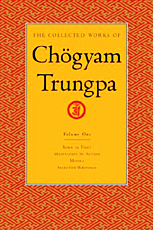About Chögyam Trungpa and His Collected Works:
Chögyam Trungpa (1939 - 1987), a Tibetan meditation master, teacher, and artist is widely known as one of the pioneers in bringing Buddhism to the West. He was born in eastern Tibet and was identified as the eleventh descendent in the line of Trungpa tulkus (incarnations of teachers). At age 18, this scholar was Supreme Abbot of the Surmang Monasteries. He fled to India when the Chinese invaded his homeland in 1959. In 1963, Chögyam Trungpa traveled to England where he attended Oxford University as a Spaulding Fellow, studying Western philosophy, religion, art, and language. He established the first Tibetan Buddhist center in Scotland in 1967.
In 1970, he was invited to teach in the United States; he settled down in Boulder, Colorado. Over the years, he established over 100 meditation centers in America, Canada, and Europe. Trungpa Rinpoche set up Shambhala International in 1973 to coordinate the activities of these centers. He also founded Naropa Institute (now Naropa University), an innovative college that combines contemplative studies with a liberal arts curriculum. A secular program for meditation called Shambhala Training was established in 1976. In 1986, Trungpa Rinpoche moved the center of his activities from Boulder to Halifax, Canada, where he died the following year.
Carolyn Rose Gimian, editor of The Essential Chögyam Trungpa (1999), is the compiler and editor of The Collected Works of Chögyam Trungpa. In each of these eight volumes, she provides an overview of the material.
About This Volume:
Volume One contains Chögyam Trungpa's early writings produced during the time he lived in Great Britain (1963-1970). Born in Tibet (1966) is a memoir of his experiences as a young monk, his duties as the abbot of a great monastery, and his relationships with his spiritual teachers. It offers a fascinating glimpse into the life of a Tibetan lama. It concludes with his escape to India and his eventual emigration to the West.
In Meditation in Action (1969), Chögyam Trungpa demonstrates how this practice and the six activities associated with it (generosity, discipline, patience, energy, clarity, and wisdom) is a training ground for compassion, awareness, and creativity in all spheres of life. Mudra (1972) is a collection of poetry, songs of devotion, and commentary on the ten traditional Zen oxherding pictures. The volume concludes with nine early articles which demonstrate Chögyam Trungpa's growing ability to present Tibetan teachings in ways that are accessible to Westerners.
